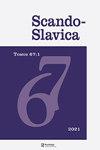“My Dear, Close and Distant Friend”: Nina Berberova’s Letters to Sergej Rittenberg (1947–1975)
IF 0.2
0 HUMANITIES, MULTIDISCIPLINARY
引用次数: 0
Abstract
the German). When Lotman wrote his Puškin biography, such a talent had particular historical poignancy, as had the elusive qualities of Puškin’s personality and oeuvre for Tynjanov and Tertz. Erik Egeberg’s Aleksandr Puškin: Russlands store dikter takes its readers through Puškin’s life and writings with a light touch, and he certainly stirs interest in reading Puškin himself. It is Egeberg’s merit that he does not reduce Puškin to easy relatability, as happened with Dostoevskij’s Brothers Karamazov during a long-running reading programme on Norwegian national radio (“Salongens lesesirkel” NRK P2) in 2019–2020. One may hope that Egeberg, but also Tynjanov, Lotman and Tertz, fall into the hands of an enterprising radio host before long. Puškin’s mercurial life and works appear to be made for it.“我亲爱的,亲密而遥远的朋友”:尼娜·贝贝罗娃给里滕伯格的信(1947-1975)
德国)。当洛特曼写他的Puškin传记时,这样一个天才有着特殊的历史辛酸,就像Puškin的个性和泰尼亚诺夫和泰尔兹的作品中难以捉摸的品质一样。Erik Egeberg的Aleksandr Puškin:俄罗斯的商店作家带读者轻松地了解了Puškin的生活和作品,他本人当然也激起了阅读Puškin的兴趣。埃格伯格的优点在于,他没有将Puškin简化为简单的相关性,就像在2019-2020年挪威国家广播电台(“Salongens lesesirkel”NRK P2)的长期阅读节目中对陀思妥耶夫斯基的《卡拉马佐夫兄弟》所做的那样。人们可能希望埃格伯格,还有泰尼亚诺夫、洛特曼和泰尔兹,不久之后会落入一个有进取心的电台主持人的手中。Puškin多变的生活和作品似乎就是为此而生。
本文章由计算机程序翻译,如有差异,请以英文原文为准。
求助全文
约1分钟内获得全文
求助全文

 求助内容:
求助内容: 应助结果提醒方式:
应助结果提醒方式:


